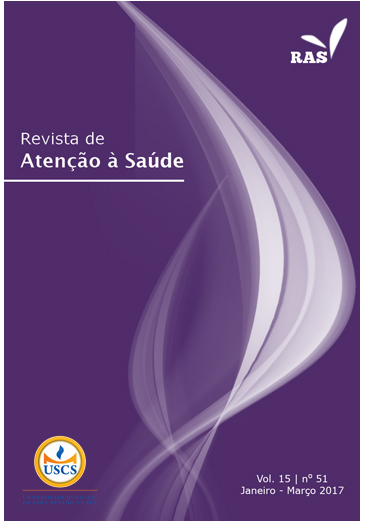Sexuality and aids in old age: an approach in medical consultation
DOI:
https://doi.org/10.13037/ras.vol15n51.4152Keywords:
Elderly, Sexuality, HIV, AidsAbstract
Objective: To investigate whether physicians or elderly patients address issues of sexuality during medical consultation and if tests are being done to detect the human immunodeficiency virus (HIV). Methodology: Doctors of geriatrics, infectious diseases, urology, internal medicine, general surgery, gynecology and psychiatry at a teaching hospital in Mogi das Cruzes (São Paulo), totaling 35 professionals, answered a questionnaire about sexuality issues addressed in consultation with the elderly. Results: Most doctors reported that the elderly have questioned mainly about erectile dysfunction, drugs for penile erection and hormone replacement and they only address such matters when there is a complaint. Only 9 out of 35 doctors talk about HIV, and 13 about sexually transmitted diseases (STD). The HIV testing request is not part of the routine of most doctors, and most seniors do not ask for the exam. Conclusion: It was observed that there is not enough dialogue between this population and physicians about STD/HIV and contraception. Also, the exam to detect the virus is not taken very often. Thus, we see the need to integrate care practices in order to promote, prevent and track HIV infection in old age.
Downloads
References
Moraes KM, Vasconcelos DP, Silva ASR, Silva RCC, Santiago LMM, Freitas CASL. Companheirismo e sexualidade de casais na melhor idade: cuidando do casal idoso. Rev Bras Geriatr Gerontol. 2011;14(4):787-98.
Maschio MBM, Balbino AP, Souza PFR, Kalinke LP. Sexualidade na terceira idade: medidas de prevenção para doenças sexualmente transmissíveis e aids. Rev Gaúcha Enferm. 2011 set [citado em 2016 jan 15];32(3):583-9. Disponível em: https://goo.gl/VUrDru
Ministério da Saúde. Boletim Epidemiológico de aids/DST. Brasília, DF: Ministério da Saúde; 2013.
Ministério da Saúde. Secretaria de Atenção à Saúde. Departamento de DST, aids e hepatites virais. Brasília, DF: Ministério da Saúde; 2008 [citado em 2014 maio 20]. Disponível em: http://www.aids.gov.br/campanhas/2008/38269>
Ministério da Saúde. Boletim Epidemiológico de DST/aids. Brasília, DF: Ministério da Saúde; 2010.
Souza LPS, Oliveira MVR, Silveira WRM, Figueiredo MFS, Messias RB, Silva JR. Análise da clientela idosa portadora de HIV atendida em um centro ambulatorial em Montes Claros, Minas Gerais. Rev Bras Geriatr Gerontol. 2012;15(4):767-76.
Santos NJS, Tayra A, Silva SR, Buchalla CM, Laurenti R. A aids no estado de São Paulo: as mudanças no perfil da epidemia e perspectivas da vigilância epidemiológica. Rev bras epidemiol [internet]. 2002 dez [citado em 2016 jan 18];5(3):286-310. Disponível em: https://goo.gl/4YTO5E
Olivi M, Santana RG, Matias TAF. Comportamento, conhecimento e percepção de risco sobre doenças sexualmente transmissíveis em grupo de pessoas com 50 anos e mais de idade. Rev Latino-Am Enfermagem [internet]. 2008 ago [citado em 2016 jan 15];16(4):679-85. Disponível em: https://goo.gl/N3gOJt
Batista AFO, Marques APO, Leal MCC, Marino JG, Melo HMA. Idosos: associação entre o conhecimento da aids, atividade sexual e condições sociodemográficas. Rev Bras Geriatr Gerontol. 2011;14(1):39-48.
Toledo LSG, Maciel ELN, Rodrigues LCM, Sá RT, Fregona G. Características e tendência da aids entre idosos no estado do Espírito Santo. Rev Soc Bras Med Trop. 2010;43(3):264-7.
Secretaria da Saúde do Estado de São Paulo. Centro de Referência e Treinamento em DST/aids. Documento de diretrizes para prevenção das DST/aids em idosos. Bepa. 2011;8(92):15-23.
Silva HR, Marreiros MOC, Figueiredo TS, Figueiredo, MLF. Características clínico-epidemiológicas de pacientes idosos com aids em hospital de referência, Teresina-PI, 1996 a 2009. Epidemiol Serv Saúde. 2011;20(4):499-507.
Alencar RA, Ciosak SI. O diagnóstico tardio e as vulnerabilidades dos idosos vivendo com HIV/aids. Rev Esc Enferm USP [internet]. 2015 abr [citado em 2016 jan 17];49(2):229-35. Disponível em: https://goo.gl/XrIkha
Ellman TM, Sexton ME, Warshafsky D, Sobieszczyk ME, Morrison EA. A forgotten population: older adults with newly diagnosed HIV. AIDS Patient Care STDs. 2014;28(10):530-6.
Brasileiro M, Freitas MIF. Representações sociais sobre aids de pessoas acima de 50 anos de idade, infectadas pelo HIV. Rev Latino-Am Enfermagem [internet]. 2006 out [citado em 2016 jan 18];14(5):789-95. Disponível em: https://goo.gl/b89t2G
Araújo VLB, De Brito DMS, Gimeniz MT, Queiroz TA, Tavares CM. Características da aids na terceira idade em um hospital de referência do estado do Ceará, Brasil. Rev Bras Epidemiol. 2007 dez [citado em 2016 jan 18];10(4):544-54. Disponível em: https://goo.gl/mOQdAx
Jansen RS. HIV/aids in persons 50 years of age and older. Atlanta: Center for Infectious Diseases Center for Diseases Control and Prevention. 2005 [citado em 2014 abr 15]. Disponível em: https://goo.gl/HPDUKM
Lazzarotto AR, Kramer AS, Hädrich M, Tonin M, Caputo P, Sprinz E. O conhecimento de HIV/aids na terceira idade: estudo epidemiológico no Vale do Sinos, Rio Grande do Sul, Brasil. Ciênc Saúde Coletiva [internet]. 2008 dez [citado em 2016 jan 18];13(6):1833-40. Disponível em: https://goo.gl/RAoG3u
Melo HMA, Leal MCC, Marques APO, Marino JG. O conhecimento sobre aids de homens idosos e adultos jovens: um estudo sobre a percepção desta doença. Ciênc Saúde Coletiva. 2012;17(1):43-53.
Linley L, Prejean J, An Q, Chen M, Hall HI. Racial/ethnic disparities in HIV diagnoses among persons aged 50 years and older in 37 US States, 2005-2008. Am J Public Health [internet]. 2012 ago [citado em 2016 jan 18];102(8):1527-34. Disponível em: https://goo.gl/GmEZhw
Slinkard MS, Kazer MW. Older adults and HIV and STI screening: the patient perspective. Geriatr Nurs. 2011;32(5):341-9.
Alencar RA, Ciosak SI. Early diagnosis of HIV in the elderly population: a brief review of the literature. Online Braz J Nurs. 2010 ago [citado em 2016 jan 18];9(2):1-10. Disponível em: https://goo.gl/O0VJnF
Downloads
Published
Issue
Section
License
Policy Proposal for Journals offering Free Delayed Access
Authors who publish in this magazine agree to the following terms:
- Authors maintain the copyright and grant the journal the right to the first publication, with the work simultaneously licensed under a Creative Commons Attribution License after publication, allowing the sharing of the work with recognition of the authorship of the work and initial publication in this journal.
- Authors are authorized to assume additional contracts separately, for non-exclusive distribution of the version of the work published in this magazine (eg, publishing in institutional repository or as a book chapter), with the acknowledgment of the authorship and initial publication in this journal.
- Authors are allowed and encouraged to publish and distribute their work online (eg in institutional repositories or on their personal page) at any point before or during the editorial process, as this can generate productive changes, as well as increase impact and citation of the published work (See The Effect of Open Access).









